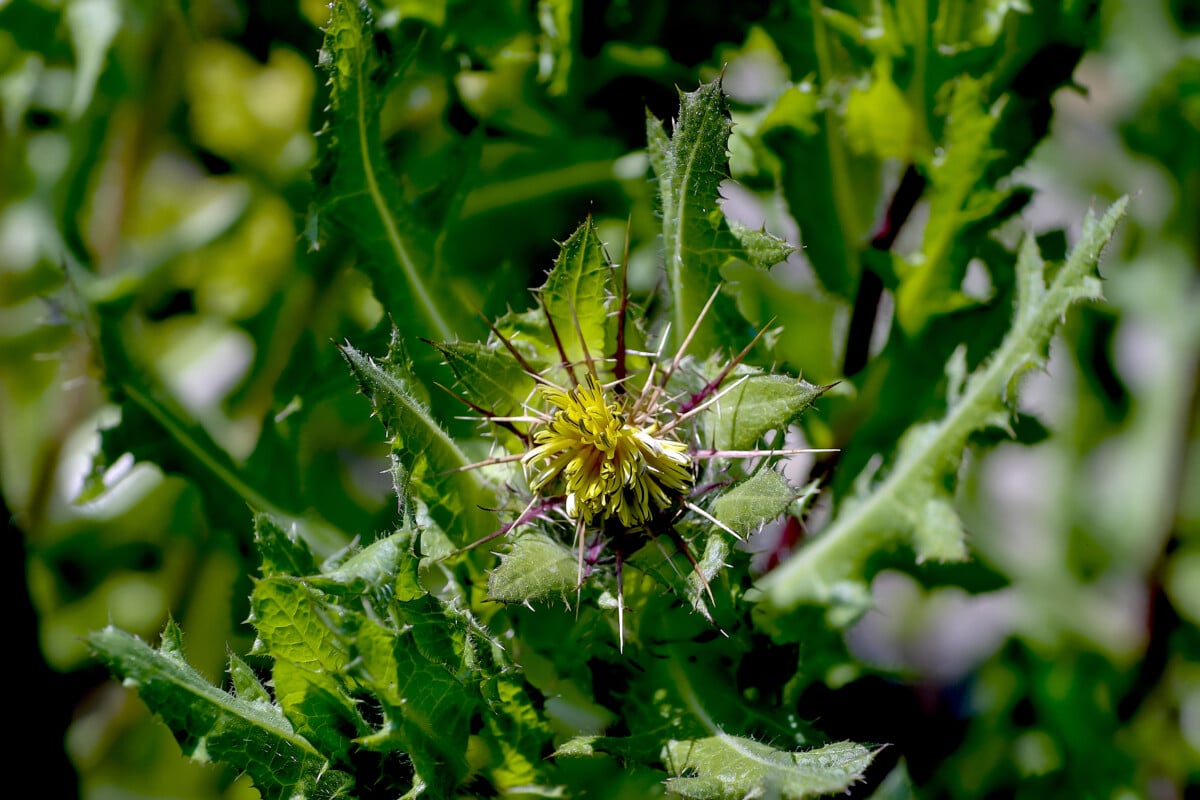
Blessed Thistle: A Comprehensive Guide to Its Uses and Benefits
Blessed thistle, also known by its scientific names Cnicus benedictus, Centaurea benedicta, and Carduus benedictus, is a plant native to the Mediterranean region. This herb has been used for centuries in various cultures as a dietary supplement and herbal product intended to support overall health. Often referred to as holy thistle, blessed thistle is recognized for its bitter properties and has traditionally been used to treat many conditions, including digestive issues and to promote milk production in nursing mothers.
Cnicus Benedictus: The Digestive Bitter
Blessed thistle herb is widely regarded as a digestive bitter that helps tonify the stomach. When taken with boiling water as a tea, it acts as a diaphoretic, encouraging sweating and promoting menstrual flow. This makes it useful for conditions such as suppressed menses caused by colds or chill. Additionally, blessed thistle is believed to support the liver, particularly in cases of sluggish liver function, and can aid in the digestion of fats, which is especially beneficial for those experiencing atonic dyspepsia or loss of appetite.
The bitter compounds in blessed thistle, including chemicals called tannins, contribute to its therapeutic effects. These tannins have astringent properties that can help reduce stomach cramps and soothe the digestive tract. However, it is important to note that high doses of blessed thistle may cause nausea and vomiting, so caution is advised when taking this herb, especially in supplement or concentrated extract form.
Milk Production and Lactation Support
One of the most popular uses of blessed thistle is as a galactagogue—a substance that promotes milk production in nursing mothers. Many mothers turn to blessed thistle supplements or teas to help increase their breast milk supply during lactation. While this herb has been traditionally used for this purpose, scientific evidence regarding its effectiveness remains limited. The lactation database and other research resources suggest that while blessed thistle may support milk production, it should not be considered a guaranteed cure for low milk supply.
Nursing mothers interested in taking blessed thistle should consult a healthcare professional before use. This is particularly important during pregnancy and lactation to ensure safety for both mother and infant. Additionally, blessed thistle should not be used as a substitute for medical advice or prescribed drugs intended to treat specific health conditions.
Preparation and Consumption
Blessed thistle is commonly consumed as a tea made by steeping the dried flowers, stems, and leaves of the plant in boiling water. This preparation method helps extract the beneficial chemicals, including tannins, that contribute to its bitter taste and medicinal properties. Some people also find that combining blessed thistle with other herbs enhances its effects, but it is essential to seek advice from a healthcare professional before using any combination of herbal products.
In addition to tea, blessed thistle is available in dietary supplements, including capsules and tinctures. When choosing supplements, it is important to prioritize quality and ensure the product is free from contaminants. The FDA does not regulate herbal supplements as strictly as pharmaceutical drugs, so selecting reputable brands is crucial.
Safety and Precautions
While blessed thistle is generally considered safe when used appropriately, taking high doses can lead to side effects such as nausea and stomach discomfort. Some individuals may also experience allergic reactions or increased sensitivity to the bitter compounds. Because blessed thistle contains chemicals called tannins, excessive consumption might cause digestive irritation or interfere with nutrient absorption.
Pregnant women should avoid using blessed thistle unless under the supervision of a healthcare professional, as its effects on pregnancy are not fully understood. Nursing mothers should also consult their healthcare provider before taking blessed thistle to ensure it is safe for their infants.
Cultural and Historical Significance
Blessed thistle has a rich history of use across many cultures, where it has been believed to possess healing properties for centuries. It has been utilized not only as a medicine but also as a food additive and in the production of certain alcoholic beverages. The yellow flowers and spiny stems of the plant have made it a recognizable thistle species in the Mediterranean region and beyond.
Its use as a traditional remedy for many things—from digestive ailments to infections and swelling—reflects the diverse applications of this plant in herbal medicine. Despite the lack of conclusive scientific evidence for some of its uses, blessed thistle remains a valued herb in natural health circles.
Conclusion
Blessed thistle is a versatile herbal product with a long history of use for supporting digestion, promoting lactation, and addressing various health concerns. Its bitter properties and the presence of tannins contribute to its therapeutic effects. However, while blessed thistle is believed to offer many benefits, scientific evidence is still evolving, and it should be used with caution, especially in high doses.
For those considering taking blessed thistle supplements or tea, consulting a healthcare professional is essential to ensure safety and effectiveness. Whether used as a tea, supplement, or in combination with other herbs, blessed thistle can be a valuable addition to a natural health regimen when used responsibly and with proper guidance.
<h2>Related Reading</h2> <ul class=”related-links”> <li><a href=”/information/amla/”>Amla: Benefits, Uses, Dosage & Safety</a></li> <li><a href=”/information/amla-shots-benefits/”>Amla Shots: Benefits</a></li> <li><a href=”/information/amla-extract-benefits/”>Amla Extract: Benefits & Dosage</a></li> <li><a href=”/phytology/phyllanthus-emblica/”><em>Phyllanthus emblica</em> (Materia Page)</a></li> </ul>
*These statements have not been evaluated by the Food and Drug Administration. This product is not intended to diagnose, treat, cure, or prevent any disease.
Masterful Display
Each and everyone of our products are deeply considered, labored over, and improved upon time and time again. We invite you to experience the difference of our carefully crafted small batches of herbal support items. Whether it be our tea line, produced for a delightful experience, or our tincture blends and extracts, we have what you need.

